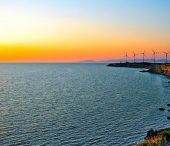Contracts for the supply of pipes for the construction of the Trans-Anatolian gas pipeline TANAP were signed on October 14 with the attendance of Turkish Prime Minister Ahmet Davutoğlu, Turkish Energy Minister Taner Yıldız, Azerbaijani Energy Minister Natig Aliyev, President of SOCAR Rovnag Abdullayev, as well as representatives from winner companies. Prime Minister Davutoğlu described TANAP as "not only an energy project, but also a peace project".
"We are determined to make the 21st century, the century of peace through energy. We aim at forming cooperation for energy, not competition" Davutoğlu said at the signing ceremony.
Route to Peace through Energy
Underlining the role of TANAP as a project for peace, Davutoğlu said “If countries are tied to each other through trade, investment and energy, this will generate peace. Remember the times when the Silk Road was the route to peace. Now the energy routes will undertake the same role. Anatolia is becoming a bridge of peace among the Balkans and Caucasia, two regions which are associated with the notion of crisis back in the 90s."
With a rapidly growing economy, Turkey has become one of the fastest growing energy markets in the world. Turkey has been experiencing rapid demand growth in all segments of the energy sector for decades. Over the last decade, Turkey has been the second country, after China, in terms of natural gas and electricity demand increase. Turkey is expected to become one of the most dynamic energy economies of the world in terms of increase in energy demand.
Turkey’s energy strategy is multi-dimensional. It strives at diversifying its energy supply sources and routes, as well as its energy basket by increasing the share of the renewables and adding the nuclear energy.
First in Europe in terms of geothermal energy
Having a substantial potential for the renewable energy resources, Turkey ranks seventh in the world and first in Europe in terms of geothermal energy. Turkey also aims at further increasing its use of hydro, wind and solar energy resources. Turkey envisages producing 30% of its electricity need from the renewables by 2023.
Turkey also aims to reduce dependency on imported fossil fuels through gradual commissioning of nuclear power into Turkish energy mix. Turkey intends to establish a nuclear capacity of more than 10.000 MW by 2030. In this respect, Turkey has already signed an intergovernmental agreement with the Russian Federation concerning the construction and operation of a nuclear power plant at the Akkuyu site. Discussions are ongoing for the second nuclear power plant (NPP) to be constructed in Sinop. A third NPP project is envisaged as well.

Turkey’s Role as a Reliable Transit Partner
Turkey is geographically located in close proximity to more than 70% of the world’s proven oil and gas reserves. Turkey, forming a natural energy bridge between the source countries, the Middle East and the Caspian basin, and consumer markets, stands as a key country in ensuring energy security through diversification of supply sources and routes, considerations that have gained increased significance in today’s Europe.
In this respect, major pipeline projects, realized and proposed, which will contribute to Europe’s energy supply security, will as well enhance Turkey’s role as a reliable transit country on the East-West as well as North-South energy axis.
Turkey aims at establishing an uninterrupted and reliable flow of the Greater Caspian and the Middle East hydrocarbon resources to Turkey and to Europe via the Turkish territory.
Oil Pipelines
The Iraq - Turkey (Kirkuk – Yumurtalık) Crude Oil Pipeline System: It transports the oil produced in Kirkuk and other areas of Iraq to the Ceyhan (Yumurtalık) Marine Terminal. The pipeline system with an annual transport capacity of 35 Million tons was commissioned in 1976. The capacity of the line was increased to 46.5 Million tons/year in 1984. With the completion of the second pipeline, parallel to the first one, the annual capacity reached 70.9 million tons as of 1987. Turkey has concluded the negotiations with the Iraqi side aiming at extending the duration of the transportation agreement via this pipeline on 19 September 2010.
Baku-Tbilisi-Ceyhan (BTC) pipeline: The main component of the East-West Energy Corridor is the Baku-Tbilisi-Ceyhan (BTC) pipeline, which is a dedicated crude oil pipeline system that extends from the Azeri-Chirag-Guneshli (ACG) field through Azerbaijan and Georgia to a terminal at Ceyhan on the Mediterranean coast of Turkey, bypassing the environmentally sensitive Black Sea and the Turkish Straits. The pipeline, which has a capacity of 1 million barrels per day, and at 1760 kilometers is the second longest of its kind in the world. The first cargo of oil, which had travelled through the BTC pipeline to Ceyhan, has been loaded onto a tanker on 4 June 2006. As of 15 October 2012, over 1.5 billion barrels of Azeri oil was loaded to tankers from Ceyhan and shipped to international markets.
International Oil Pipelines

Natural Gas Pipelines
Russia–– Turkey Gas Pipeline: It is in operation since 1987. The capacity reached to 6bcma in 1993. In 1998, additional 8 bcm gas contracted and capacity increased to 14 bcm.
Blue Stream: It is a major trans-Black Sea gas pipeline that carries natural gas from Russia into Turkey. Preparations of the pipeline project started in 1997. On 15 December 1997, Russia and Turkey signed an intergovernmental agreement on construction of the subsea pipeline. At the same time, Gazprom and BOTAŞ signed a 25-year gas sale contract. By 2010, Blue Stream is expected to be operating at full capacity, delivering 16 billion cubic meters of natural gas per annum.
Baku-Tbilisi-Erzurum (BTE) Natural Gas Pipeline: The second component of the East-West Energy Corridor, namely BTE, has become operational as of 3 July 2007. Designed to transport natural gas from the Shah Deniz field in the Azerbaijan sector of the Caspian Sea, through Georgia to Turkey, it is envisaged that the pipeline will export 6,6 billion cubic meters a year according to the Agreement between our country and Azerbaijan for Shah Deniz Phase I. As for Phase II, a common understanding was reached between the parties on 7 June 2010 in Istanbul in terms of both Azeri natural gas amount to be exported by Turkey, and Azeri natural gas amount to be exported to Europe via Turkey, and also price and transit tariffs.
Moreover, the transportation of Caspian natural gas resources via multiple pipelines to Europe through such projects as the interconnection of the gas pipeline networks of Turkey, Greece and Italy within the Southern Gas Corridor will also constitute an essential component of Europe’s energy diversification efforts. Turkey supports all Southern Gas Corridor projects passing through the Turkish territory.
Turkey-Greece Interconnector : The incorporation of Turkey’s energy network with that of the EU was realized with the conclusion of the Intergovernmental Agreement on the Turkey-Greece Interconnector signed in February 2003 and the Sale and Purchase Agreement between BOTAŞ and DEPA in December 2003. The Trilateral Intergovernmental Agreement for the Turkey-Italy-Greece Interconnector was signed in Rome on 26 July 2007.
The Turkey-Greece Interconnector became operational on 18 November 2007, following the inauguration ceremony held in Ipsala with the participation of Prime Ministers of both countries.
Nabucco Pipeline: The Nabucco-West pipeline (also referred to as the Turkey–Austria gas pipeline) is a proposed natural gas pipeline from the Turkish-Bulgarian border to Austria.
Eastern Anatolian Pipeline: It is a 1,491 km-long natural gas pipeline, which runs from Tabriz in North-West Iran to Ankara in Turkey. It started operation on December 10th, 2001. In 2008, approximately 4.1 bcm was imported.
International Natural Gas Pipelines

Turkey’s new move in energy diplomacy: the Trans-Anatolian Pipeline Project (TANAP): The TANAP project envisages gas transportation from the Shah Deniz field in Azerbaijan to Europe through Turkey. The initial capacity is expected to reach 16 billion cubic meters per year. The construction of the 1,850-km-long TANAP is planned to be started in 2015 and completed in 2018 in three stages. The pipeline will then be connected to the Trans-Adriatic Pipeline (TAP). The project cost is estimated at over $10 billion. Gas from Azerbaijan will be carried out to Europe via Turkey as the EU is exploring options to reduce its dependence on Russian resources. First deliveries of gas to Europe through the pipes are expected in 2019.
Sources: http://www.kdk.gov.tr/






